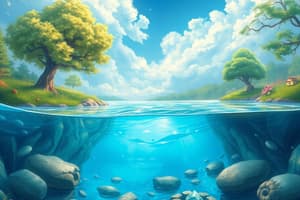Podcast
Questions and Answers
What is the chemical formula of water?
What is the chemical formula of water?
- HO
- CO2
- H2O2 (correct)
- O2
Why is water considered an excellent solvent?
Why is water considered an excellent solvent?
- Due to its colorless nature
- Because it's hot to touch
- Because it can dissolve many types of molecules and compounds (correct)
- Because it is radioactive
What does the water cycle help maintain?
What does the water cycle help maintain?
- Balance of carbon dioxide in the atmosphere
- Balance of fresh water available
- Balance of animal species in ecosystems (correct)
- Balance of saltwater in oceans
Which human activities can lead to water pollution?
Which human activities can lead to water pollution?
What purpose do artificial cycles like water treatment facilities serve?
What purpose do artificial cycles like water treatment facilities serve?
Why is water critical for all living creatures?
Why is water critical for all living creatures?
Why is proper waste management and cleanup crucial for healthy aquatic environments?
Why is proper waste management and cleanup crucial for healthy aquatic environments?
What is one way governments contribute to conservation efforts related to water usage?
What is one way governments contribute to conservation efforts related to water usage?
What is the purpose of purification systems in the context of water treatment?
What is the purpose of purification systems in the context of water treatment?
How do conservation policies help communities during drought periods?
How do conservation policies help communities during drought periods?
In what ways do purification systems contribute to ensuring safe drinking water?
In what ways do purification systems contribute to ensuring safe drinking water?
What are some common purifying agents used in water treatment processes?
What are some common purifying agents used in water treatment processes?
Flashcards are hidden until you start studying
Study Notes
Water is essential for life on Earth. It forms about 60% of our bodies and plays numerous roles in ecosystems. As a substance, it has several key properties: water is colorless, odorless, tasteless, and almost transparent. However, its chemical formula is H2O, which means two hydrogen atoms bonded with one oxygen atom. It's also an excellent solvent because it can dissolve many types of molecules and compounds due to its polar covalent bonds. Because of these unique characteristics, water is critical for all living creatures, plants, animals, and even insects, to survive.
The water cycle refers to how water moves through various parts of the world via evaporation, precipitation, runoff, and other processes. This cycle helps maintain the balance of fresh water available for humans and wildlife alike. Without this cycle, there would be insufficient clean drinking water on the planet. Alongside this natural process comes artificial cycles like water treatment facilities, desalination plants, etc., ensuring we have enough safe drinkable water.
However, due to human activities, some problems occur regarding water quality. Pollution from industrial waste, agricultural chemicals, sewage discharge, mining operations, oil spills, and so forth can contaminate rivers, lakes, oceans, groundwater supplies, and aquifers. When pollutants enter water sources, they threaten both people who consume them and the environment where those waters flow. Thus, proper waste management and cleaning up after ourselves is crucial if we want healthy aquatic environments now and into future generations.
In response, conservation efforts have been made worldwide. For example, governments often mandate certain practices related to water usage such as regulating irrigation techniques used by farmers growing crops near large cities. They might even restrict how much potable tap water households receive during drought periods or set rules controlling when industries may release effluents into streams or rivers. These policies help decrease the impact of overuse or mismanagement while still allowing communities access to adequate amounts of clean drinking water.
Finally, methods exist to remove impurities from water; these are known as purification systems. Purification occurs through different means depending on whether you need potable water or just treated water suitable for washing clothes, dishes, cars, etc.. Some common purifying agents include chlorine gas, activated carbon filters, ion exchange resins, UV radiation units, and reverse osmosis filtration devices. All these technologies ensure that users get high-quality liquid without worrying about harmful bacteria lurking within its depths. So overall, understanding these cycles and their interplay with each other will greatly enhance your appreciation for what makes our daily survival possible - having reliable access to good-tasting clear fluid!
Studying That Suits You
Use AI to generate personalized quizzes and flashcards to suit your learning preferences.




